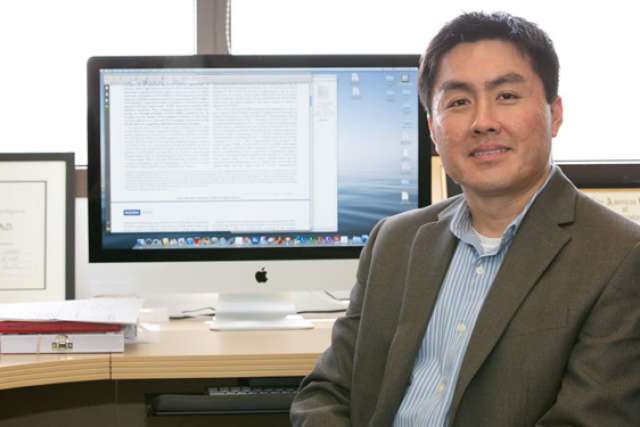Dr. Roger S. Lo, UCLA Jonsson Comprehensive Cancer Center member and assistant professor of medicine, divisions of dermatology and molecular and medical pharmacology, has received the 33rd Annual American Association of Cancer Research (AACR) Award for Outstanding Achievement in Cancer Research. The award was presented at the AACR Annual Meeting 2013, held in Washington, D.C., April 6 to 10. Dr. Lo delivered his award lecture titled "How Melanoma Escapes From BRAF Inhibition," at the meeting.
“I am extremely honored to be recognized by the AACR and by this particular award, especially given the notable figures in cancer research who have previously received it,” said Lo. “I accept it on behalf of my research team at UCLA and my collaborators and mentors. The support I have received from my family and wife has been absolutely critical. This award also acknowledges the sacrifices made by cancer patients in the search for greater knowledge.”
Since 1979, the AACR Award for Outstanding Achievement in Cancer Research has honored an investigator younger than 40 years old to recognize meritorious achievements in cancer research. Award recipients are nominated by their peers and selected by the AACR International Selection Committee. Final determination is made by the AACR Executive Committee. Past recipients (click here for a full list of previous awardees) include many of the most recognized names and leaders in cancer research today.
Lo is being recognized for his seminal contributions to the understanding of how cancers resist molecularly targeted therapies known as BRAF inhibitors. His research into how a deadly skin cancer known as BRAF-mutant melanoma adapts to BRAF inhibition is directly applicable to patients and has accelerated the clinical development of combination therapies designed to prevent resistance to BRAF inhibitor treatment in these patients. More than half of all cases of melanoma are the type with the BRAF mutation, and this work also may be relevant to cancers besides melanoma.
In 2008, after observing the striking first response improvements in patients with BRAF-mutant melanoma to the BRAF inhibitor vemurafenib, Lo began to work on understanding how patients who had not yet relapsed were able to acquire resistance to BRAF inhibitor-based therapy. This research led Lo to uncover several molecular mechanisms by which BRAF-mutant melanomas escape the anticancer effects of drugs such as vemurafenib, as well as help to determine why the development of another type of skin cancer, nonmelanoma squamous cell carcinoma, was a side effect of these therapies.
Lo found that one of the most frequent ways in which melanomas become resistant to BRAF inhibitors is through a signaling pathway inside the cells called MAPK and that the MAPK was also commonly responsible for squamous cell skin cancer in patients treated with BRAF inhibitors. These data provided the major scientific rationale for combining a BRAF inhibitor with a MAPK pathway inhibitor called MEK. This combination therapy also appears to reduce the adverse events associated with treatment with a BRAF inhibitor alone. Three phase III trials testing combined BRAF and MEK inhibitors in patients with BRAF-mutant melanoma are currently underway.
A second signaling pathway Lo identified as responsible for melanomas resisting BRAF inhibitor therapy suggested that combining a BRAF inhibitor with other inhibitors (a PI3K inhibitor or an AKT inhibitor) could be effective treatments. A clinical trial testing this idea using the BRAF inhibitor dabrafenib combined with an AKT inhibitor has been designed and has begun early accrual of patients.
Lo received his undergraduate degree from Stanford University, his medical degree from Cornell University Medical College in New York, N.Y., and his doctorate from the tri-institutional program at Cornell University Medical College, Rockefeller University and the Sloan-Kettering Institute. He completed an internship in medicine and a residency in dermatology at UCLA. Lo is also a Stand Up to Cancer 2011 Innovative Research Grant awardee and has been elected to the American Society for Clinical Investigation.




